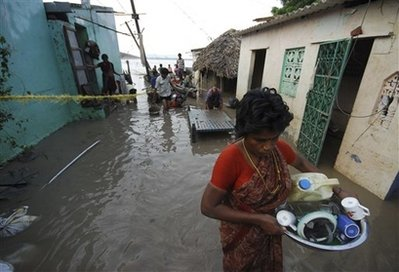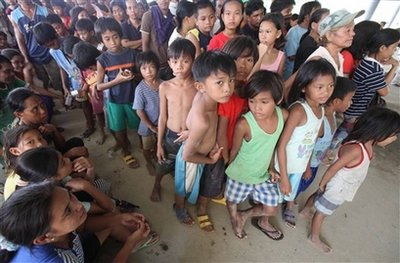A confederation of Catholic relief, development and social service groups says the harsh effects of climate change were already a daily reality to poor communities in many of the 200 countries where it works.
Now, it warns, they are undermining the humanitarian and development work of its 164 members and threatens to increase the number of emergencies in the future.
In a new report released ahead of the Copenhagen climate summit in December, Caritas Internationalis is urging governments to adopt an effective legal binding agreement to cut greenhouse gas emissions and increase financial and technological aid for poor countries so they can adapt to harsher climatic conditions.
The report also recognizes that poor countries need support to be able to develop in a sustainable way that will not further impact climate change. Beyond Copenhagen, the report believes that seismic shifts in daily lifestyle patterns will be central to combating climate change.
“The new report, 'Climate Justice: Seeking a New Global Ethic,' develops clear moral arguments based on the Bible and Catholic Social Teaching that seek to transcend narrow personal and national interests in favor of the common good and that will drive political and social action,” says Caritas Internationalis President Cardinal Oscar Rodriguez Maradiaga.
“U.N. climate change talks in Copenhagen in December will offer a once-in-a-generation opportunity for world leaders to take the necessary action to respond to climate change challenges,” he adds.
"The science and economics of what must be done are clear, but for any new deal to be a success it must lead to more moderate lifestyles for us all.”
According to the United Nations Framework Convention on Climate Change, 2009 is a crucial year in the international effort to address climate change.
In December, national government delegations who agreed to shape an ambitious international response to climate change in 2007 will be meeting for an end-of-the-year summit in Copenhagen, where they will seek to agree on a post-2012 climate agreement that will replace the current Kyoto Protocol.
Under the current deal, 37 industrial countries are required to cut emissions a total 5 percent from 1990 by 2012. Based on the current declarations from wealthy countries, the World Wildlife Fund for Nature estimates the total emissions cut will amount to 10 percent by 2020.
According to some scientists, however, industrialized nations must cut emissions by 25 to 40 percent from 1990 levels by 2020 to prevent climate disasters, such as coastal flooding from rising sea levels, severe weather events, and variations in rainfall and temperatures that will affect agriculture and wipe out species of plants and animals.
Some groups have blamed the recent escalation of natural disasters in South Asia on the effects of climate change, prompting Asian countries such as the Philippines to urge rich nations to toughen emissions cuts. In recent weeks, international relief groups have had their hands full with disasters including the quake-triggered tsunami that hit American Samoa, Samoa and Tonga; typhoons that have flooded more than 80 percent of the Philippines’ capital city of Manila and severely damaged more than 150,000 homes in Vietnam’s Quang Nam province; two powerful earthquakes that struck Indonesia, killing at least 784; and devastating floods in southern India, where millions of poor villagers are facing an imminent food shortage.
In the forward of Caritas' report, Caritas Secretary General Lesley-Anne Knight cited the recent encyclical of Pope Benedict XVI, ”Caritas in Veritate,” in which the pontiff defined solidarity as “first and foremost a sense of responsibility on the part of everyone with regard to everyone.”
To desire the common good and strive toward it, the pope wrote, “is a requirement of justice and charity.”
Adding to that, Knight said, “Victory over climate change will come at a price, and the lion’s share of that price should rightly be paid by those who have benefited most from the growth and development that is causing climate change.”
Currently, the largest emitters of greenhouse gas in the world is China, followed by the United States, Russia and India. Japan, the world's second-largest economy, was ranked fifth on the list released last week by the International Energy Agency.
In their report, the Paris-based agency, which acts as energy policy adviser to 28 member countries of the Organization for Economic Co-operation and Development (OECD), urged member countries to make investments in renewable energy, biofuels and nuclear power to stabilize green house gas emissions.
It also urged member countries to adopt a carbon trading system in their industrial sectors and called for the participation of non-OECD member countries in the carbon reduction project starting in 2020.




















